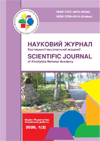UDC : 37.032(09):792 DEVELOPMENT PECULIARITIES OF DOMESTIC THEORY AND PRACTICE OF USING THEATER ART IN EDUCATIONAL WORK WITH CHILDREN IN THE FIRST THIRD OF THE XX CENTURY
DOI : https://doi.org/10.51706/2707-3076-2020-2-2
Abstract
The article presents the results of the analysis of historical materials on the use of theatrical art as a means of education, training and socialization of children by teachers and theatrical practitioners of Ukraine in the early twentieth century. The in-depth analysis of archival sources, manuscripts, and old printed works allowed to distinguish teachers whose achievements allow us to understand the peculiarities of the formation of the theoretical foundations and practice of introducing theatrical art into the educational system of Ukraine.
During this historical period, the following issues were raised: the age limits of children's involvement in theatrical creativity, the specifics of the audience; mechanisms of children's dramatic creativity and development of appropriate approaches to the organization of theatrical work with children; requirements for repertoire selection; stages of acquainting children with theatrical art, methods of organizing and conducting rehearsal work, etc.
Scholars and educators of the time noted that children and adolescents who played only for their peers and parents could be involved in theatrical work; acquaintance with theatrical art should begin with simple theatrical forms, dramatized games, acting out charades, proverbs, "living pictures" and gradually move on to staging dramatic works; the basis of children's theatrical play are emotional experiences, and therefore the task of the leader is to emotionally captivate the child, put him/her in the right emotional state.
Based on the analysis of culturological aspects of the functioning of theatrical art in society, theoretical approaches to understanding the pedagogical possibilities of theater and the practice of using theatrical art in school, it was determined that pedagogical materials of the early twentieth century emphasized the importance of theater for the development of human aesthetics, moral and ethical qualities of the personality, activation of his/her creative forces, psychological and psychophysical characteristics of a child: imagination, memory; self-awareness, emotions, feelings, empathy, communication skills and abilities. Possibilities of theatrical art in fostering children’s mastering a native language, in the training of attentive and competent spectators were defined.


